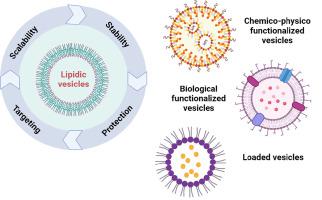Journal of Controlled Release ( IF 10.5 ) Pub Date : 2021-10-23 , DOI: 10.1016/j.jconrel.2021.10.025 Mayank Handa 1 , Sarwar Beg 2 , Rahul Shukla 1 , Md Abul Barkat 3 , Hani Choudhry 4 , Kamalinder K Singh 5

|
Cancer is a leading cause of death in many countries around the world. However, the efficacy of current treatments available for variety of cancers is considered to be suboptimal due to the pathophysiological challenges associated with the disease which limits the efficacy of the anticancer drugs. Moreover, the vulnerability towards off-target effects and high toxicity also limits the use of drugs for the treatment of cancers. Besides, the biopharmaceutical challenges like poor water solubility and permeability of the drugs, along with the absence of active targeting capability further decreases the utility of drugs in cancer therapy. As a result of these deficiencies, the current therapeutic strategies face noncompliance to patients for providing meaningful benefits after administration. With the advancements in nanotechnology, there has been a paradigm shift in the modalities for cancer treatment with the help of phytomedicine-based nanosized drug delivery systems coupled with variegated surface-engineering strategies for targeted drug delivery. Among these delivery systems, lipid-based nanoparticles are considered as one of the highly biocompatible, efficient and effective systems extensively explored for anticancer drug delivery. These include diverse range of systems including liposomes, nanoemulsions, solid lipid nanoparticles, nanostructured lipidic carriers and supramolecular carriers, which alters pharmacokinetic and biodistribution of the drugs for active targeting to the desired site of action by overcoming the biopharmaceutical challenges associated with anticancer drug delivery. The present review endeavours to provide a comprehensive account on the recent advances in the application of lipid-based nanostructured systems for improving the pharmacotherapeutic performance of phytomedicines for cancer targeting application.
中文翻译:

用于癌症靶向的脂质工程多功能纳米植物药物的最新进展
癌症是世界上许多国家的主要死因。然而,由于与限制抗癌药物功效的疾病相关的病理生理学挑战,目前可用于各种癌症的治疗的功效被认为是次优的。此外,脱靶效应和高毒性的脆弱性也限制了药物治疗癌症的使用。此外,药物的水溶性和渗透性差等生物制药挑战,以及缺乏主动靶向能力,进一步降低了药物在癌症治疗中的效用。由于这些缺陷,当前的治疗策略在给药后不能提供有意义的益处,因此患者不依从。随着纳米技术的进步,在基于植物医学的纳米药物递送系统以及用于靶向药物递送的多样化表面工程策略的帮助下,癌症治疗方式发生了范式转变。在这些递送系统中,基于脂质的纳米颗粒被认为是一种高度生物相容性、高效和有效的抗癌药物递送系统。这些包括多种系统,包括脂质体、纳米乳剂、固体脂质纳米颗粒、纳米结构脂质载体和超分子载体,它们通过克服与抗癌药物递送相关的生物制药挑战来改变药物的药代动力学和生物分布,以主动靶向所需的作用部位。











































 京公网安备 11010802027423号
京公网安备 11010802027423号